Today's society is fueled by technology, which makes even the most difficult tasks doable and simple. The invention of self-driving cars, which was just imaginary some decades ago, has come to reality, all thanks to technology and the programmers who developed that technology.
If you are in the computer programming domain, your work completely revolves around various programming languages , operating systems , data structures and algorithms, databases , and many other aspects. Have you ever wondered about the origins of these various facets of programming? All these are the inventions of great programmers.
But who exactly are the programmers ? Programmers are professionals capable of writing computer programs that instruct computer systems to perform a specific task. They are responsible for designing, developing, testing, deploying, and maintaining software applications. Also, they are in charge of updating and optimizing existing computer programs.
No matter what type of programmer you are, whether it is a web developer, software developer, or software engineer, your contribution helps society as well as the software development industry to grow.
The software development industry has been blessed with a lot of legendary programmers that have made the industry evergreen with their incredible and commendable inventions. There are numerous well-known programmers across the globe. However, we have curated a list of the 10 best programmers in the world of all time.
10 Best Programmers in the World of All Time
Let us get familiar with the 10 best programmers in the world whose inventions or contributions have made this digital world possible.
1. Dennis Ritchie
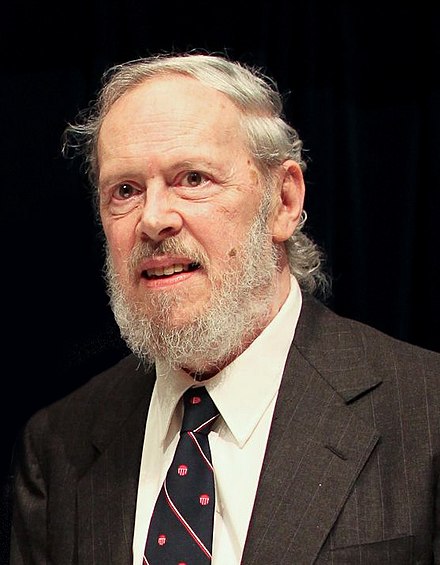
(September 9, 1941, to October 12, 2011)
Dennis MacAlistair Ritchie, an American computer scientist, is widely known as the ‘Father of the C programming language.’ Also, he created the UNIX operating system and the B programming language in a corporation with Ken Thompson. He is the co-author of the book named ‘ The C Programming Language ’.
Born in Bronxville, New York, Ritchie graduated from Harvard University and pursued a degree in applied mathematics and physics. Later, he started working on his Ph.D. thesis on ??’Computational Complexity and Program Structure’ at Harvard but was never awarded a Ph.D. degree as he failed to submit the bound copy of his dissertation.
Without the C programming language , it would not have been possible to develop various operating systems, game consoles, embedded systems, databases, compilers, browsers, and many other devices and software applications. All thanks to Dennis Ritchie for designing the C language.
Awards
- Turing Award from ACM in 1983 for the implementation of UNIX OS.
- IEEE Richard W. Hamming Medal from IEEE in 1990 for C and UNIX.
- The National Medal of Technology from President Clinton in 1999.
- Achievement Award by Industrial Research Institute in 2005.
- Japan Prize for Information and Communications in 2011.
Dennis’s thought on UNIX:
“UNIX is basically a simple operating system, but you have to be a genius to understand the simplicity.”
2. Linus Torvalds

Born on 28 December 1969
Linus Benedict Torvalds, a Finnish software engineer, is the mastermind behind the Linux Kernel. The Linux kernel is the primary component of the Linux operating system that acts as a bridge between a computer system’s hardware and its processes. All the Linux distributions and some other operating systems, like Android, leverage the Linux Kernel.
Another popular invention by Linus Torvalds is a leading and well-known distributed version control system named Git. Another software developed by Linus was Subsurface, free and open-source software for logging and planning scuba dives.
Born in Helsinki, he graduated with a master’s degree in computer science from the University of Helsinki. After the first year of his graduation, he joined Finnish Navy Nyland Brigade in 1989, which was an 11-month officer training program. Later, in 1990, he resumed his graduation.
Awards
- Electronic Frontier Foundation (EFF) Pioneer Award in 1998.
- Lovelace Medal from the British Computer Society in 2000.
- Vollum Award from Reed College in 2005.
- C&C Prize by the NEC Corporation in 2010.
- Millennium Technology Prize in 2012.
- IEEE Computer Pioneer Award by IEEE in 2014.
- IEEE Masaru Ibuka Consumer Electronics Award by IEEE in 2018.
A Thought from Linus Torvalds
“In open-source, we feel strongly that to really do something well, you have to get a lot of people involved.”
3. Bjarne Stroustrup

Born on 30 December 1950
Bjarne Stroustrup, a Danish computer scientist, is the creator of the C++ programming language. Currently, he is working as a professor of Computer Science at Columbia University. Not only Stroustrup developed the C++ language but also evolved it a lot.
Also, he is the author of the book “The C++ Programming Language.” Some other books that Stroustrup co-authored are A Tour of C++, Programming: Principles and Practice Using C++, The Design and Evolution of C++, and The Annotated C++ Reference Manual. In addition to these books, he has penned down more than 100 articles on C++ programming and 100+ technical reports for the C++ standards committee.
Born in Aarhus, Denmark, Stroustrup graduated with a master’s degree in mathematics and computer science from Aarhus University. Later, he earned a Ph.D. degree in computer science from the University of Cambridge.
Awards
- ACM Grace Murray Hopper award in 1993.
- William Procter Prize for Scientific Achievement by Sigma Xi in 2005.
- Faraday Medal from the IET (Institute of Engineering Technology) in 2017.
- Computer Pioneer Award from The IEEE Computer Society in 2018.
- Charles Stark Draper Prize from The US National Academy of Engineering in 2018.
Bjarne Stroustrup’s Thought on C++
“C makes it easy to shoot yourself in the foot; C++ makes it harder, but when you do it blows your whole leg off.”
4. James Gosling
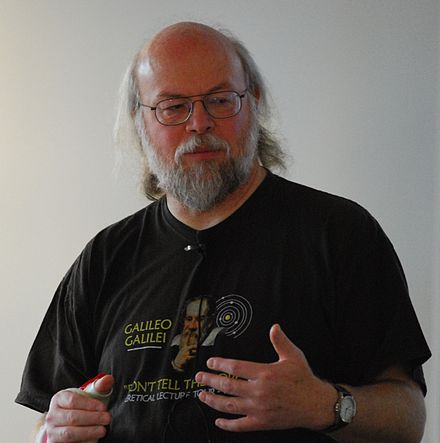
Born on May 19, 1955
James Gosling, a Canadian computer scientist, is a creator and lead designer of the Java programming language. He is widely known as ‘The Father of the Java Programming Language.’ In addition, he designed the compiler, virtual machine, and mainframe for Java.
As a creator of the Java language, he has written as well as co-authored a lot of Java books, including The Java Programming Language, The Java Language Specification, The Real-Time Specification for Java, The Java Application Programming Interface - Vol 1 and Vol 2, and An Introduction to the Network/Extensible Window System.
Goslings attended the William Aberhart High School in Calgary, Alberta. Later, he pursued a bachelor’s degree in computer science from the University of Calgary and an M.A. and Ph.D. in computer science from Carnegie Mellon University. During his doctorate, he developed the version of Emacs called Gosling Emacs and built a multi-processor UNIX version. After joining Sun Microsystems, he developed a lot of compilers and mail systems.
Awards
- The Economist Innovation Award in 2002.
- The Flame Award USENIX Lifetime Achievement Award in 2002.
- IEEE John von Neumann Medal in 2015.
- Became an officer of the Order of Canada in 2007.
- Became a fellow of the Association for Computing Machinery in 2013.
Gosling’s Thought
“I think it would be a tragic statement of the universe if Java was the last language that swept through.”
5. Tim Berners-Lee

Born on 8 June 1955
Tim Berners-Lee or TimBL, an English computer scientist, is well-known as the creator of the World Wide Web (WWW). it would not have been possible for you to read this blog if TimBL would not have created the web. It is all because of TimBL that we are able to access hundreds and thousands of websites conveniently.
He is the director of the World Wide Web Consortium (W3C) and supervises the ongoing development of the web. Also, he is a director of the Web Science Research Initiative (WSRI) and the senior researcher and chairman at the MIT Computer Science and Artificial Intelligence Laboratory (CSAIL). He is also a founder of the Open Data Institute, a professor at the Massachusetts Institute of Technology (MIT), and a professional fellow of Computer Science at the University of Oxford.
Born in London, England, he attended Sheen Mount Primary School and London's Emanuel School. Later, he pursued a Bachelor of Arts degree in physics from Queen's College, Oxford.
Awards
- A Fellow of the Royal Society (FRS) in 2001.
- Honored by Queen Elizabeth II in the 2004 New Year Honours.
- Elected as a member of the American Philosophical Society in 2004
- Appointed to the Order of Merit (OM) in 2007.
- Chosen as a member of the National Academy of Engineering in 2007.
- Queen Elizabeth Prize for Engineering in 2013.
- The 2016 ACM Turing Award in 2017.
Tim Berners-Lee’s Thought on the Web
“The Web does not just connect machines, it connects people.”
6. Donald Knuth

Born on January 10, 1938
Donald Ervin Knuth, an American computer scientist, is the ‘Father of the Analysis of Algorithms.’ In computer programming, the analysis of the algorithm is the method of determining the computational complexity of algorithms. Here, computation complexity refers to the amount of time, storage, and other resources utilized for the execution of algorithms.
Moreover, he is well-known for his contributions to the development of the analysis of algorithms and systematic formal mathematical techniques for it. In doing this, he also made asymptotic notation popular around the world. Besides, he developed the TeX computer typesetting system and its associated METAFONT, a font definition language, and a rendering system.
Furthermore, he is also the creator of the WEB and CWEB computer programming systems and the designer of the MIX/MMIX instruction set architectures. He co-authored all the volumes of a book named The Art of Computer Programming .
Born in Milwaukee, Wisconsin, he went to Milwaukee Lutheran High School. Later, he studied physics at the Case Institute of Technology and earned Ph.D. in mathematics from the California Institute of Technology.
Awards
- First ACM Grace Murray Hopper Award in 1971.
- Turing Award in 1974.
- Lester R. Ford Award in 1975 and 1993.
- Josiah Willard Gibbs Lecturer in 1978.
- National Medal of Science in 1979
- Golden Plate Award of the American Academy of Achievement in 1985
- Franklin Medal in 1988
- John von Neumann Medal in 1995
- Harvey Prize from the Technion in 1995
- Kyoto Prize in 1996
- Katayanagi Prize in 2010
- BBVA Foundation Frontiers of Knowledge Award in 2010
- Stanford University School of Engineering Hero Award in 2011
- Flajolet Lecture Prize in 2014
Donald Knuth’s Thought
“If you optimize everything, you will always be unhappy.”
7. Ken Thompson
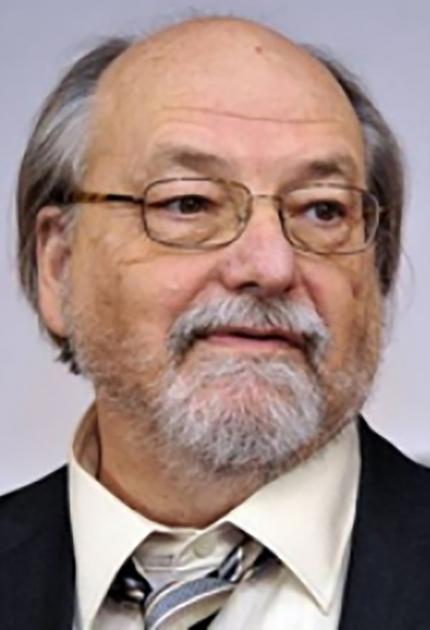
Born on February 4, 1943
Kenneth Lane Thompson, an American pioneer of computer science, is the creator of the UNIX operating systems. He spent most of his career life at the Bells Laboratories for the development of UNIX OS. He was one of the development members of the Plan 9 operating system. Also, he is the designer of the B programming language, which is the predecessor of the C language.
Besides, he utilized his skills in developing text editors, such as QED and ed, which were compatible with early computers. He is also notable for his contribution to regular expressions. Moreover, he was involved in the development of computer chess, which resulted in the development of the endgame tablebases and Belle, a chess machine.
Born in New Orleans, Louisiana, he holds a bachelor’s degree in computer science and a master’s degree in both computer science and electrical engineering from the University of California, Berkeley.
Awards
- Turing Award in 1983.
- Elected a Member of the National Academy of Sciences (NAS) in 1985.
- IEEE Richard W. Hamming Medal by IEEE in 1990.
- National Medal of Technology from President Bill Clinton in 1999.
- Tsutomu Kanai Award by the Institute of Electrical and Electronics Engineers in 1999.
- Japan Prize for Information and Communications in 2011.
Ken Thompson’s Thought
“When in doubt, use brute force.”
8. Brian Wilson Kernighan
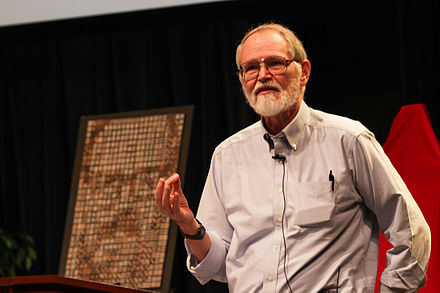
Born on born 1942
Brian Wilson Kernighan, a Canadian computer scientist, is well-known for his contributions to the development of the UNIX operating system, along with Dennis Ritchie and Ken Thompson. He is the author of several UNIX programs, including ditroff. In addition, he co-authored two programming languages, namely AWK and AMPL.
Moreover, he, along with Shen Lin, designed the two popular heuristics for two NP-complete problems, namely graph partitioning and the traveling salesman problem. He is the co-author of the book “The C Programming Language”, along with Dennis Ritchie and ‘The Go Programming Language’.
Currently, he is a professor of computer science at Princeton University and the director of undergraduate studies in the Department of Computer Science.
Born in Toronto, he studied at the University of Toronto and pursued a bachelor’s degree in engineering physics. Later, he earned a Ph.D. degree in electrical engineering from Princeton University.
Awards
- Elected as a member of the National Academy of Engineering in 2002.
- Elected a member of the American Academy of Arts and Sciences in 2019.
Brian Wilson Kernighan’s Thought
“Controlling complexity is the essence of computer programming.”
9. Richard Stallman

Born on March 16, 1953
Richard Matthew Stallman is an American programmer and free software movement activist. He runs campaigns to spread the idea of distributing software to users in such a manner that they can use, study, and modify software programs. And software programs that allow users to do all the aforementioned activities are free software.
Stallman is the founder of the Free Software Foundation and launched the GNU Project. Also, he wrote the GNU General Public License and developed the GNU Compiler Collection and GNU Emacs. For a long time, he has been a lead architect and organizer of the GNU Project and developed various pieces of software under it. Some of them include the GNU Emacs text editor, GNU Debugger, and GNU Compiler Collection.
Born in New York City, he attended the Columbia University Saturday program. For graduation, he enrolled in Harvard University. At the end of the first year, he became a programmer at the MIT Artificial Intelligence Laboratory. Later, he went on to pursue a doctorate in physics at the Massachusetts Institute of Technology (MIT) but left after a year.
Awards
- Exceptional merit award MacArthur Fellowship in 1990.
- The Association for Computing Machinery's Grace Murray Hopper Award in 1990.
- Electronic Frontier Foundation's Pioneer Award in 1998.
- Yuri Rubinsky Memorial Award in 1999.
- The Takeda Techno-Entrepreneurship Award in 2001.
- ACM Software System Award in 2008.
- Social Medicine award from GNU Solidario in 2016.
Richard Stallman’s Thought
Free software is a matter of liberty, not price. To understand the concept, you should think of ‘free’ as in ‘free speech, ‘ not as in ‘free beer.’
10. Guido van Rossum
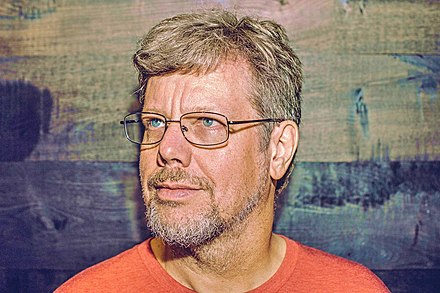
Born on 31 January 1956
Guido van Rossum, a Dutch programmer, is a creator of the Python programming language. For this creation, he is Python’s "benevolent dictator for life" (BDFL), but he resigned from the position in 2018. However, he was a member of the Python Steering Council till 2019, and later, he withdrew his name from the nominations for the 2020 elections.
Furthermore, he assisted in the development of the ABC programming language, wrote the glob() routine and contributed to the BSD Unix, and developed Grial, a web browser, in Python. He also worked at various research institutes and was employed at tech giants, including Google, DropBox, and Microsoft.
Born in the Netherlands, he holds a master’s degree in computer science and mathematics from the University of Amsterdam.
Awards
- A bronze medal in the International Mathematical Olympiad in 1974.
- The 2001 Award for the Advancement of Free Software from the Free Software Foundation (FSF) in 2002.
- NLUUG Award in 2003.
- Awarded the honorary title of Dijkstra Fellow by CWI in 2019.
Guido van Rossum’s Thought
“If you decide to design your own language, there are thousands of sort of amateur language designer pitfalls.”
Conclusion
Here we have approached the end of our list of the 10 best programmers in the world. The contribution and the development work of all the aforementioned programmers have made the lives of humans more convenient. Their innovation is helping a lot of young minds as they are able to create innovations that once seemed to be impossible.
People are also reading:




